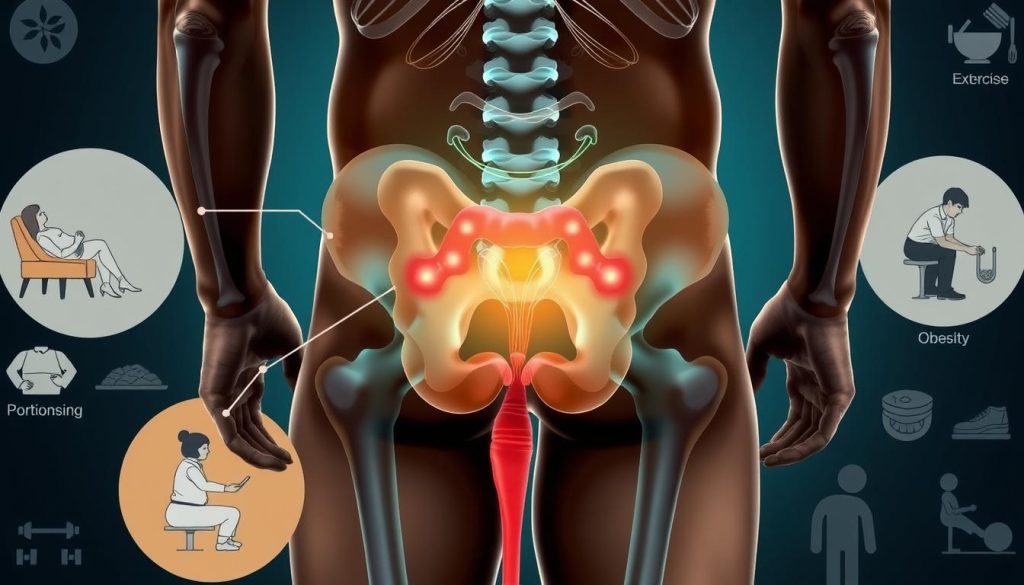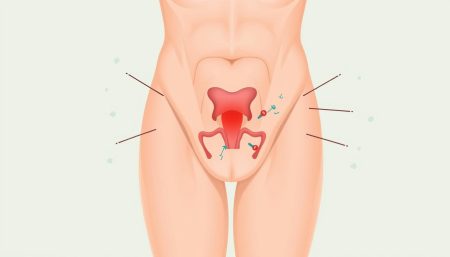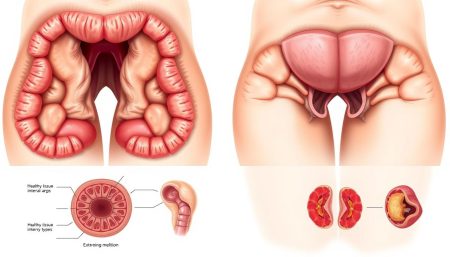It’s key to know what causes hemorrhoids in men to prevent and treat them. Hemorrhoids can really hurt and affect how well you live. There are many risk factors for hemorrhoids, from how you live to your body’s health. We’ll look at the hemorrhoids in men symptoms, why men get them, and how to prevent and treat them.
Spotting symptoms early, like pain or itching, helps men get the right treatment. Things like sitting too long, what you eat, and other factors can cause them. Knowing this helps men manage their health better.
Key Takeaways
- Identifying the common causes of hemorrhoids in men to inform preventive strategies.
- Distinguishing between external and internal hemorrhoids in men symptoms for better diagnosis.
- Understanding how lifestyle and dietary choices serve as significant risk factors for hemorrhoids.
- Learning the importance of early detection and management in reducing the development of severe hemorrhoid complications.
- Gaining insights into the importance of discussing family history as a possible risk factor for hemorrhoids.
Understanding Hemorrhoids and Their Prevalence in Men
Hemorrhoids are swollen veins in the lower rectum and anus, similar to varicose veins. They can cause a lot of discomfort and worry. It’s important for men to know about hemorrhoids causes and prevention of hemorrhoids. This section will explain what hemorrhoids are, why they happen, and how common they are in men.
Hemorrhoids in men symptoms can vary from mild to severe. Symptoms include bleeding, itching, swelling, and pain. These symptoms can be embarrassing, which might stop men from getting medical help early on.
Men are more likely to get hemorrhoids than women, mainly because of lifestyle and work-related factors. To prevent hemorrhoids, men should eat more fiber, drink plenty of water, and exercise regularly.
It is estimated that up to 50% of men aged 50 years and older may suffer from this condition at some point in their lives, highlighting the need for targeted awareness and preventive strategies.
Here is a brief overview of statistical data that outlines the prevalence and impact of hemorrhoids on men:
| Age Group | Prevalence | Common Symptoms | Recommended Prevention Strategies |
|---|---|---|---|
| 20-30 years | Less Common | Mild discomfort | High-fiber diet, adequate hydration, regular exercise |
| 31-50 years | Moderately Common | Discomfort, occasional bleeding | |
| 51+ years | Very Common | Pain, bleeding, itching |
It’s key to understand the link between hemorrhoids causes and hemorrhoids in men symptoms for early detection and prevention. Men are at higher risk, especially as they get older. Taking proactive steps towards a healthier lifestyle can help prevent and manage symptoms.
Regular doctor visits can help catch and treat hemorrhoids early, preventing worse problems. By learning more and staying informed, men can better take care of their health and avoid getting hemorrhoids.
What Causes Hemorrhoids in Men: The Primary Triggers
To understand what causes hemorrhoids in men, we need to look at both biological and lifestyle factors. Hemorrhoids are not just common health issues. They are also influenced by specific behaviors and traits unique to men.
Anatomy and Physiology Behind Hemorrhoids
Hemorrhoids are vascular structures in the anal canal that help with stool control. But when they swell or get inflamed, they become a problem. Men are more likely to get them because of the pressure on the rectal veins. This pressure can be caused by straining during bowel movements or increased abdominal pressure.
This shows why it’s important to know the risk factors for hemorrhoids. It helps us take steps to prevent them.
Lifestyle Factors Contributing to Hemorrhoids
Certain lifestyle choices can make hemorrhoids worse in men. Diet, exercise, and sitting habits are key factors:
- Diet: Eating foods low in fiber can cause constipation. This means you have to strain more, which increases pressure on the rectal veins.
- Exercise: Being active regularly helps reduce pressure on veins. This includes the veins that can lead to hemorrhoids.
- Sitting habits: Sitting for long periods, especially on bad surfaces, can increase the risk of inflamed hemorrhoids. This is because it raises the pressure on the rectum.
Changing these lifestyle factors can help lower the risk of getting inflamed hemorrhoids. Being aware and taking action is key.
The Impact of Diet on Men’s Hemorrhoid Risk
Diet plays a big role in whether or not men get hemorrhoids. Some foods can make it more likely, while others can help prevent it.
How Poor Nutrition Can Lead to Hemorrhoids
Poor nutrition is a big factor in getting hemorrhoids. It often leads to constipation and straining when you go to the bathroom. Foods low in fiber are especially bad because they don’t help your body digest well.
This makes it harder for your body to move waste, putting more pressure on your veins. This pressure can cause hemorrhoids to form.
Specific Foods Known to Aggravate or Prevent Hemorrhoids
Knowing which foods can help or hurt is key to managing hemorrhoids. Some foods, like spicy ones and caffeine, can make symptoms worse. On the other hand, a diet rich in fiber can help prevent them.
| Aggravating Foods | Preventative Foods |
|---|---|
| Processed snacks | Whole grains |
| Red meat | Leafy greens |
| High-sugar foods | Fruits like pears and apples |
| Alcoholic beverages | Legumes |
Eating whole grains, fruits, veggies, and legumes helps digestion and can prevent hemorrhoids. Making these changes can lower your risk and improve your gut health.
Physical Strain and Hemorrhoids: A Link to Consider
Understanding hemorrhoids causes and risk factors for hemorrhoids is key. Physical strain, especially in activities that raise abdominal pressure, is a major cause. For men, this often means heavy lifting or intense workouts.
It’s important to see how these activities lead to hemorrhoids. Straining can increase pressure in the lower rectum, making hemorrhoids more likely. This pressure can swell blood vessels, causing hemorrhoids.

To prevent hemorrhoids, changing how we do strenuous activities is crucial. Here are some tips to adjust your exercise and daily activities:
- Use proper lifting techniques: Bend at the knees, not the waist, to avoid straining the rectal area.
- Take frequent breaks: Regular breaks during long activities can help reduce pressure.
- Do exercises that strengthen your core and improve posture, which can reduce strain on the rectal and anal areas.
| Activity | Risk Level | Preventive Action |
|---|---|---|
| Heavy Lifting | High | Use support belts, lift in teams |
| Long Periods of Sitting | Moderate | Take short walks every hour |
| Intense Exercise | High | Moderate intensity, focus on technique |
By understanding risk factors for hemorrhoids and making these changes, we can prevent them. Avoiding too much physical strain helps manage health better.
Occupational Hazards: Jobs That May Increase Hemorrhoid Risk
Learning about hemorrhoids causes in different jobs helps us find ways to prevent them. This part looks at jobs that might increase the risk of getting hemorrhoids. It focuses on jobs that are either very sedentary or very physically demanding.
Sedentary Work Environments and Their Effects
Jobs that involve sitting for long periods, like office work, can raise the risk of hemorrhoids. Sitting for too long can slow down blood flow and put extra pressure on veins near the anus. This makes people who sit a lot more likely to get hemorrhoids.
- Using ergonomic chairs can help prevent hemorrhoids.
- It’s good to take breaks and do some light exercise to improve blood flow.
Occupations Requiring Intense Physical Labor
On the other hand, jobs that require a lot of physical effort can also be risky. Doing tasks that require a lot of strength, like lifting heavy things, can increase pressure in the abdomen. This is a known risk factor for hemorrhoids.
- Learning the right way to lift and using supportive equipment is key.
- It’s important for employers to teach workers about the dangers of heavy lifting and how to avoid it.
The Role of Physical Fitness in Preventing Hemorrhoids
Keeping fit is key in preventing hemorrhoids. Regular exercise can help ease hemorrhoids in men symptoms and stop them from getting worse. It’s important to mix aerobic exercises with strength training. This helps your digestion and blood flow, which are crucial for managing hemorrhoids.

But not all exercises are good. Activities that put too much strain on your lower belly can make hemorrhoids worse. Here, we look at exercises that help and those to avoid for better health with hemorrhoids.
| Recommended Exercises | Exercises to Avoid |
|---|---|
| Walking | Weightlifting heavy weights |
| Swimming | Extensive biking |
| Yoga | Horseback riding |
| Pilates | Rowing |
Choosing the right exercises can make a big difference. Walking and swimming are great because they’re good for your heart without putting too much pressure on your bottom. On the other hand, heavy weightlifting should be avoided because it can put too much strain on your belly and bottom.
Changing your workout routine can help prevent hemorrhoids and reduce their symptoms. By doing this and getting regular check-ups, you can live a healthier, more comfortable life.
Internal vs. External Hemorrhoids: Identifying the Differences
It’s important to know the difference between internal and external hemorrhoids. Each type has its own challenges and symptoms. Knowing the difference is key for anyone dealing with hemorrhoids in men symptoms.
Characteristics of Internal Hemorrhoids
Internal hemorrhoids are hidden inside the rectum. They don’t usually cause pain unless they get big. A sign of internal hemorrhoids is painless bleeding when you have a bowel movement.
Understanding External Hemorrhoids
External hemorrhoids are visible and feelable around the anus. They can cause itching, discomfort, and pain. Swelling and painful lumps are signs of external hemorrhoids.
These hemorrhoids can be very painful, especially when you move your bowels or sit. They might also cause clotting or thrombosis, making the pain worse. This often needs quick medical help.
| Feature | Internal Hemorrhoids | External Hemorrhoids |
|---|---|---|
| Location | Inside the rectum | Around the anus |
| Symptoms | Painless bleeding, potential prolapse | Pain, itching, noticeable lumps |
| Treatment Impact | Less invasive treatments effective | May require more invasive procedures |
Recognizing the Symptoms of Hemorrhoids in Men
Knowing hemorrhoids in men symptoms and what causes them is key. The pain can be mild or very severe. It can affect your daily life and how well you feel.

At first, it’s important to tell if you have internal or external hemorrhoids. Each type shows symptoms differently:
| Symptom | Internal Hemorrhoids | External Hemorrhoids |
|---|---|---|
| Visibility | Generally not visible | Visible as lumps around the anus |
| Discomfort | Painless bleeding during bowel movements | Pain and irritation |
| Other Signs | Protrusion during bowel movements, retracting on their own | Thrombosed hemorrhoids can form blood clots, intensifying pain |
Spotting symptoms early is crucial. It helps in getting treatment quickly. This can prevent serious issues like anemia or strangulated hemorrhoids.
Managing hemorrhoids in men symptoms starts with recognizing them early. Knowing what can make symptoms worse is also important. This knowledge helps in talking about symptoms with doctors more clearly.
The Influence of Genetics and Family History on Hemorrhoids
The link between genetic predisposition to hemorrhoids and family history is quite strong. Knowing the risk factors for hemorrhoids helps in preventing them early. This knowledge can lead to better prevention strategies for those with a family history of hemorrhoids.
Studies Linking Hemorrhoids to Genetic Predispositions
Recent studies have found a strong genetic predisposition to hemorrhoids. People with family members who have hemorrhoids are at higher risk. Genetics can affect how well veins handle pressure, which might lead to hemorrhoids.
Discussing Hemorrhoids With Family Members for Early Detection
Talking about hemorrhoids can be tough. But, it’s important to discuss family health histories openly. Early detection and lifestyle changes can help prevent hemorrhoids in those at risk. Being aware and acting early can manage hemorrhoid risks well.
How Aging Affects Men’s Risk of Developing Hemorrhoids
As men get older, their bodies change in ways that can lead to hemorrhoids. This makes aging and hemorrhoids a key area for health and prevention. It’s especially important for older adults to understand and tackle the risk factors for hemorrhoids.

Older men often see a weakening in the tissues that support the veins in the rectum and anus. This can lead to hemorrhoids. Also, less physical activity can make things worse, causing constipation and straining during bowel movements. This shows why it’s vital to take steps to prevent this in the lifestyle of aging males.
- Maintaining a fiber-rich diet to ease bowel movements
- Engaging in regular, moderate exercise
- Staying hydrated to prevent constipation
- Periodic medical check-ups
These steps can help prevent hemorrhoids in older men. It’s good to start these habits early and keep them up as you get older. This way, you can fight off the increased risks that come with aging.
As men age, it’s crucial to adjust lifestyle habits to maintain digestive health and prevent conditions like hemorrhoids, known to be more prevalent in the older population.
By adding these prevention strategies to your life, you can lessen the effects of aging on hemorrhoids. This can help men live more comfortably and healthily as they age.
Inflamed Hemorrhoids: Causes and Complications
Knowing what causes inflamed hemorrhoids is key to preventing and treating them. These problems often start when veins in the pelvic and rectal areas get too much pressure. This can happen due to constipation, sitting for long times, or straining during bowel movements. Spotting the signs early and getting hemorrhoids treatment quickly can help avoid worse problems.
Understanding Inflammation of Hemorrhoidal Tissue
Inflamed hemorrhoids show up as pain, swelling, and bleeding. These issues can come from chronic constipation or pressure from pregnancy. Eating more fiber, staying hydrated, and having good bowel habits can help manage symptoms.
Potential Complications from Untreated Inflamed Hemorrhoids
Not treating inflamed hemorrhoids can lead to serious issues. These include thrombosed hemorrhoids, where blood clots form, severe anemia from too much blood loss, and even rectal prolapse. So, it’s important to see a doctor right away.
Here’s a comparison of symptoms in mild versus severe hemorrhoid cases. It shows why acting fast is so important:
| Symptom | Mild Case | Severe Case |
|---|---|---|
| Pain Level | Moderate, occasional | Severe, persistent |
| Bleeding | Light, only during bowel movements | Heavy, frequent, possibly leading to anemia |
| Swelling | Minimal, often internal | Significant, external and painful |
| Impact on Daily Activities | Limited | Extensive, affecting mobility and comfort |
In conclusion, knowing the causes and risks of inflamed hemorrhoids is crucial. Taking steps to prevent them and seeing a healthcare provider for hemorrhoids treatment can greatly lower the chance of serious hemorrhoids complications.
Effective Home Remedies for Alleviating Symptoms
Dealing with hemorrhoids can be tough, but there are home remedies that can help. These remedies can ease symptoms and help prevent future problems. Making lifestyle and dietary changes is key to effective hemorrhoids treatment.
Sitz baths are a top home remedy for hemorrhoids. Soaking in warm water for 15 minutes several times a day can help. It’s especially good after bowel movements.

Topical treatments are also important. Witch hazel applied to external hemorrhoids can reduce swelling and itching. Over-the-counter creams and suppositories can also help manage discomfort.
| Treatment Type | Description | Frequency of Use |
|---|---|---|
| Sitz Baths | Warm water bath targeting the affected area. | 3-4 times daily |
| Witch Hazel | Natural astringent applied with a cotton ball. | As needed after bowel movements |
| High-fiber Diet | Incorporates fruits, vegetables, and whole grains to ease bowel movements. | Daily |
Dietary changes are crucial for prevention of hemorrhoids. A high-fiber diet helps prevent constipation. This reduces the strain on hemorrhoids. Drinking enough water also helps make stools softer and easier to pass.
For more information on home remedies for hemorrhoids, check out health resources. These remedies can help with current discomfort and prevent future problems.
Making lifestyle changes is also important. Regular exercise improves circulation and helps avoid sitting or standing for too long. These changes, along with home remedies, offer a complete approach to managing and preventing hemorrhoids.
When to Seek Medical Attention for Hemorrhoids
Dealing with hemorrhoids in men symptoms can sometimes need more than just home remedies. It’s important to know when to see a doctor for hemorrhoids treatment.
Signs That Indicate the Need for Professional Help
- Persistent bleeding during bowel movements
- Severe pain or discomfort
- Signs of infection such as swelling, fever, or pus
- hemorrhoids in men symptoms that do not improve with standard hemorrhoids treatment regimens
Seeking medical attention for hemorrhoids is key if you have any of these symptoms. It means your condition might be more serious than you think.
What to Expect During a Medical Examination
At the clinic, you’ll get a physical check-up. This might include a digital rectal exam. Here’s what you can expect:
- Discussion of symptoms and medical history
- Visual and physical examination of the affected area
- Additional tests if required, such as an anoscopy
Knowing what to expect can help reduce anxiety about seeking medical attention for hemorrhoids. It prepares you both mentally and practically for the visit.
Latest Advances in Hemorrhoids Treatment for Men
The field of hemorrhoids treatment has made big strides. New technologies and methods aim to make treatments more comfortable and quick. These advancements are especially true for internal hemorrhoids and external hemorrhoids, tackling symptoms and causes more effectively.
Minimally invasive procedures have become more refined. This means less surgery and less pain for patients. Techniques like rubber band ligation and sclerotherapy have been improved to reduce complications.
Also, new hemorrhoids treatments include better topical medications. These medications offer pain relief and reduce swelling, making treatment more effective.
| Treatment Type | Description | Recovery Time |
|---|---|---|
| Minimally Invasive Procedures | Techniques such as laser therapy and infrared coagulation | 1-2 weeks |
| Topical Treatments | Advanced creams and suppositories | Immediate relief, continuous use |
| Surgical Advances | Less invasive surgical options with improved precision | 2-4 weeks |
Better diagnostic tools are also key in treating hemorrhoids. New imaging helps doctors tell internal from external hemorrhoids. This means treatments can be more targeted and effective.
There’s a big push for better post-treatment care and lifestyle advice. Patients learn the value of a high-fiber diet, staying hydrated, and exercising regularly. This helps prevent hemorrhoids from coming back.
These new developments make treatments more effective and comfortable. They improve the lives of those with hemorrhoids, especially men. As technology keeps improving, we can expect even better results in treating this common issue.
Conclusion
In this article, we explored the world of hemorrhoids, focusing on causes, risk factors, and their impact on men’s health. We found that preventing hemorrhoids involves making dietary changes, staying active, and being aware of job-related risks. It’s important to know the signs and symptoms of hemorrhoids to catch them early.
Living a healthy lifestyle and knowing your family history can help prevent hemorrhoids. If symptoms do show up, knowing when to see a doctor is key. We believe in the importance of getting medical help for proper treatment.
The best way to handle hemorrhoids is through prevention and education. Men should take charge of their health and talk openly about it. This way, they can better understand and manage hemorrhoids, leading to better health.
FAQ
Q: What are hemorrhoids, and why do they develop in men?
A: Hemorrhoids are swollen veins in the lower rectum and anus, like varicose veins. Men may get them from straining during bowel movements or sitting for long periods. A diet low in fiber can also lead to constipation and increase the risk.
Q: What are the main risk factors for hemorrhoids in men?
A: Main risks include a sedentary lifestyle and obesity. Chronic constipation or diarrhea, heavy lifting, and prolonged sitting also increase the risk. Age, genetics, and certain health conditions play a role too.
Q: Can diet influence the likelihood of developing hemorrhoids?
A: Yes, diet is key. A low-fiber diet can cause constipation and straining, raising the risk. But, a high-fiber diet, plenty of fluids, and foods that aid digestion can help prevent them.
Q: Can physical fitness prevent hemorrhoids?
A: Regular exercise and a healthy weight can help. They improve circulation, reduce constipation, and lower pressure on veins in the lower rectum and anus.
Q: How do internal hemorrhoids differ from external hemorrhoids?
A: Internal hemorrhoids are inside the rectum and often not visible. They may bleed but usually don’t hurt. External hemorrhoids are under the skin around the anus, can be felt or seen, and can be painful, especially if inflamed or thrombosed.
Q: What are some common symptoms of hemorrhoids in men?
A: Symptoms include pain, itching, and swelling around the anus, painful bowel movements, and bleeding during bowel movements. Internal hemorrhoids may also prolapse, causing more discomfort and potential complications.
Q: Do genetics play a role in the development of hemorrhoids?
A: Yes, genetics may play a part. Family history of hemorrhoids could increase your risk, affecting how common and severe they are.
Q: How does aging affect men’s risk of developing hemorrhoids?
A: Aging increases the risk as tissues supporting veins in the rectum and anus weaken and stretch. Elderly people are more likely to get hemorrhoids due to age-related changes in the body.
Q: What complications can arise from untreated inflamed hemorrhoids?
A: Untreated hemorrhoids can lead to chronic blood loss and anemia. Straining may cause a protruding or prolapsed hemorrhoid. A thrombosed hemorrhoid, with a clot causing severe pain and inflammation, is another complication.
Q: What home remedies are effective for alleviating symptoms of hemorrhoids?
A: Home remedies include sitz baths several times a day and over-the-counter creams or ointments. Applying ice packs to reduce swelling and using moist towelettes instead of dry toilet paper can also help. Increasing dietary fiber to soften stool and reduce straining is beneficial.
Q: When should I seek medical attention for hemorrhoids?
A: Seek medical attention for significant bleeding, severe pain, or if hemorrhoids don’t improve with home treatment in a week. Also, if symptoms mimic hemorrhoids but are accompanied by changes in bowel habits or stool color, seek help promptly.
Q: What are the latest advances in hemorrhoids treatment for men?
A: Recent advances include minimally invasive procedures like rubber band ligation, sclerotherapy, and infrared coagulation. Improved surgical techniques like hemorrhoidectomy and stapled hemorrhoidopexy have also been developed. These offer better recovery times and effectiveness.


















